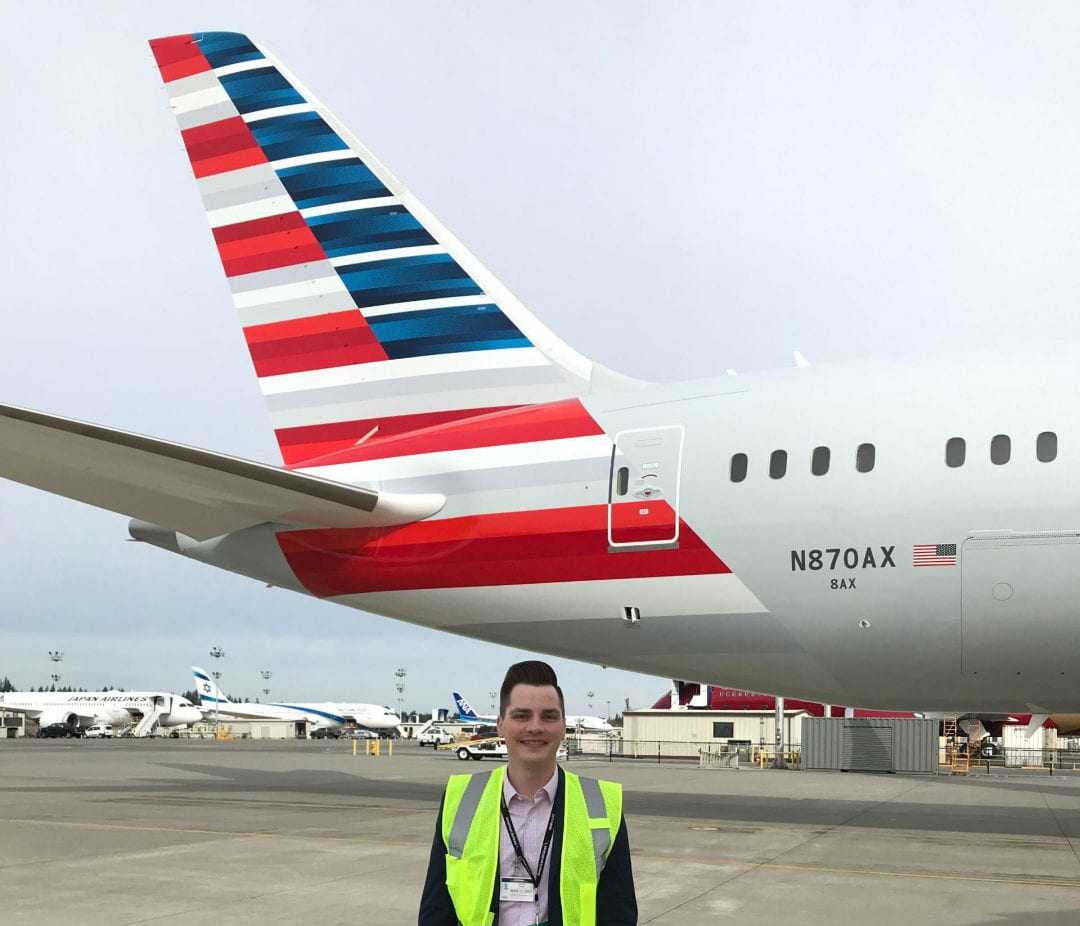By Matthew Parker
The pandemic was particularly challenging for the travel and hospitality industries. Before I joined my team at Hyatt Hotels Corporation as a senior sales enablement manager, my department had shrunk to 25% of its previous size. Like many companies today, we are still doing more with less, and the time and resource constraints have forced us to thoughtfully prioritize our projects to ensure the greatest utility.
Fortunately, I love what I do and I believe I work with the greatest sales team in the business. In my role I am responsible for supporting our group and event sales teams at all Hyatt properties, with the end goal of maximizing sales through various initiatives, programs, training and technology.

Matthew Parker (MBA ’22) worked for American Airlines before joining Hyatt Hotels Corporation.
Having worked manufacturing and retail jobs during college, I never guessed I’d end up in the travel industry. Growing up, I knew I wanted to work in business, but I didn’t have a clear idea of what it looked like. Through lots of exploration, I realized I enjoyed event planning and project management and that I was good at it. It would be nice to say my current role was my plan all along. It wasn’t. I am in my current role all because at one point in time I was laid off, I networked, someone gave me a chance, I worked hard to gain experience, the pandemic happened, and I always tried to explore beyond my role.
In 10 years, I have worked for eight different companies. As a result, I’ve learned that finding joy in your work comes from three things – the company, the role and the coworkers. Hyatt, while a large company, feels small. I attribute this to the great culture, where experienced professionals mentor others and leaders are looking to support development opportunities.
I am where I am today because I made the most of opportunities afforded to me and I explored beyond my role at the company. Below is some advice on how to do that:
Make the most of all opportunities.
How do you know what you like if you don’t try new things? I have always been a curious person, wanting to be involved in everything. In secondary school I was involved at some point with almost every extracurricular activity from music and sports to speech and student council. Extracurriculars are a great way to learn about your interests After entering the workforce, I still found ways to be involved in things outside my role such as employee business cohorts at work, industry associations, faith groups and community organizations. All of these provide opportunities for personal growth, giving back to others and an easy way to network.
Look beyond your role and explore.
Doing a good job at work is expected, but keeping my eyes open to the big picture has allowed me to advance in my career. As an event planner at American Airlines, I would routinely shadow coworkers in other departments. Neither Network Planning nor Fleet Purchasing had anything to do with my job, but exploring beyond my role allowed me to learn about other parts of the company and positions I might like. This exploration allowed me to be a more informed employee as I worked on new projects within the scope of my role. For example, while shadowing in Fleet Planning, I might learn about a new aircraft being purchased which I could use to plan a marketing event focused on the launch. I even found my current job at Hyatt by exploring beyond my role.
Looking for ways to engage and learn outside the scope of my regular routine made me more aware of new possibilities and led to promotions. Everyone’s career ambitions are different. Finding enriching opportunities for yourself and exploring beyond your role can help you identify interests early.
Treat every day like an interview.
My career is proof you can work your regular job and gain interest from another company. When working with others either internally or externally, always keep in mind they could be your future manager. Not only does this create the potential for future opportunities, it means you are always doing your best work. Having a strong work ethic and drive is important when looking to have a dynamic career.
Make your career goals known.
So often when I mentor others, I ask them what their career goals are, and they don’t have a clear answer. This is problematic because if you haven’t thought about where you want to go, then how will you ever get there? I believe you should know your career goals and tell them to anyone who will listen, especially your leader(s). You never know – your coworker in another department may be in a meeting where they are talking about creating a new position you would be perfect for. This meeting would normally be insignificant, but it has the potential to drastically alter your career now your coworker is aware. You should also always be sure your manager is aware of your goals. One of their primary responsibilities, as a people leader, is to assist with your development. If they aren’t familiar with your aspirations, they cannot offer you special projects or other exploratory opportunities to help you reach your goals. Keeping your career plans a secret is the same as not having them at all.
Find ways to mentor and keep learning.
There are endless new things to learn. Learning allows you to go beyond job experience and take the next step with your career. Learning can be something simple, like shadowing a coworker in another department—or structured, like getting industry certifications, going to educational conferences, completing online trainings, or even pursuing another degree. Leaders never stop learning. Learning can also take the form of mentorship. As you advance in your career take time to identify younger professionals whom you can mentor and help in their career. At the same time, find someone more experienced than you and seek mentorship. While training courses and degrees offer learning on a more general level, mentor-mentee relationships also provide a forum to learn on a personal level. Together with your mentor you can address issues specific to your situation and development. Both education and mentorship are essential to continuous learning.
 Matthew Parker earned his MBA from Kellstadt, with a focus on hospitality leadership, in June 2022. He has extensive experience in event planning and project management having held roles with multiple companies including American Airlines, before joining Hyatt Hotels Corporation as a senior sales enablement manager. Originally from Murray, Kentucky, Parker currently lives in Irving, Texas a suburb of Dallas. In his free time he enjoys traveling and discovering new places.
Matthew Parker earned his MBA from Kellstadt, with a focus on hospitality leadership, in June 2022. He has extensive experience in event planning and project management having held roles with multiple companies including American Airlines, before joining Hyatt Hotels Corporation as a senior sales enablement manager. Originally from Murray, Kentucky, Parker currently lives in Irving, Texas a suburb of Dallas. In his free time he enjoys traveling and discovering new places.



Recent Comments